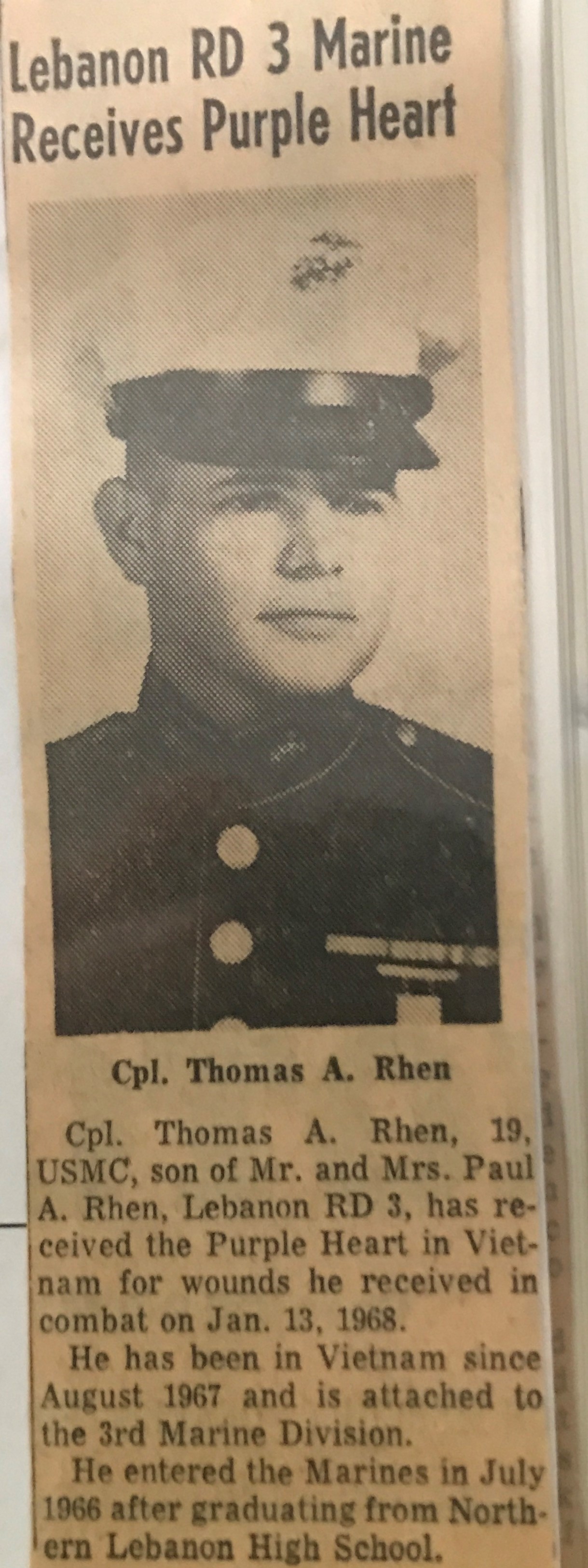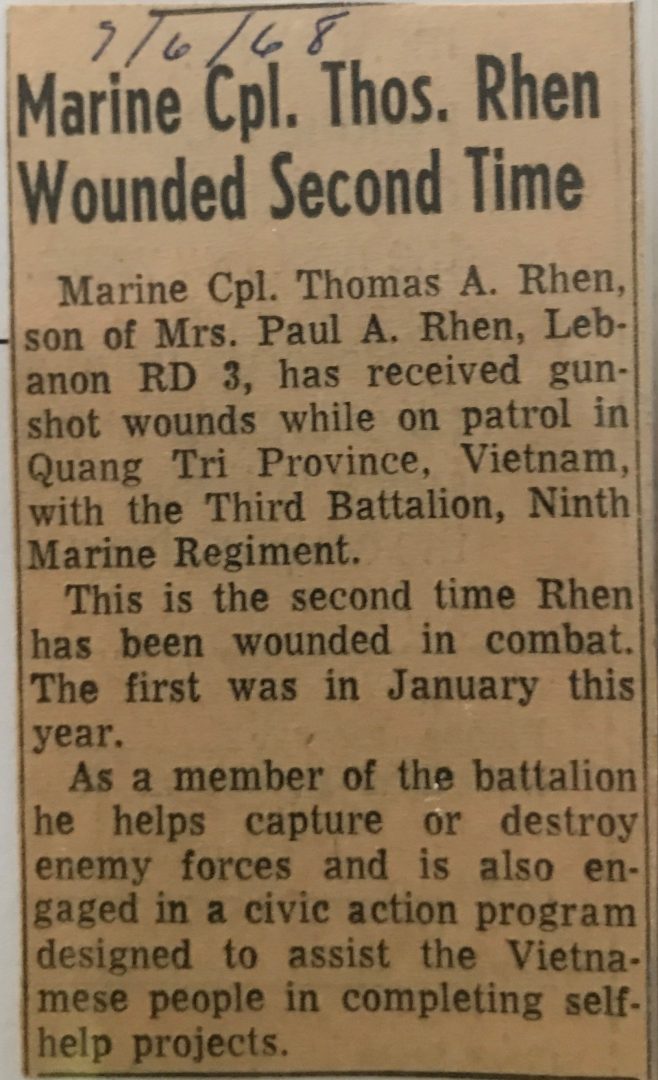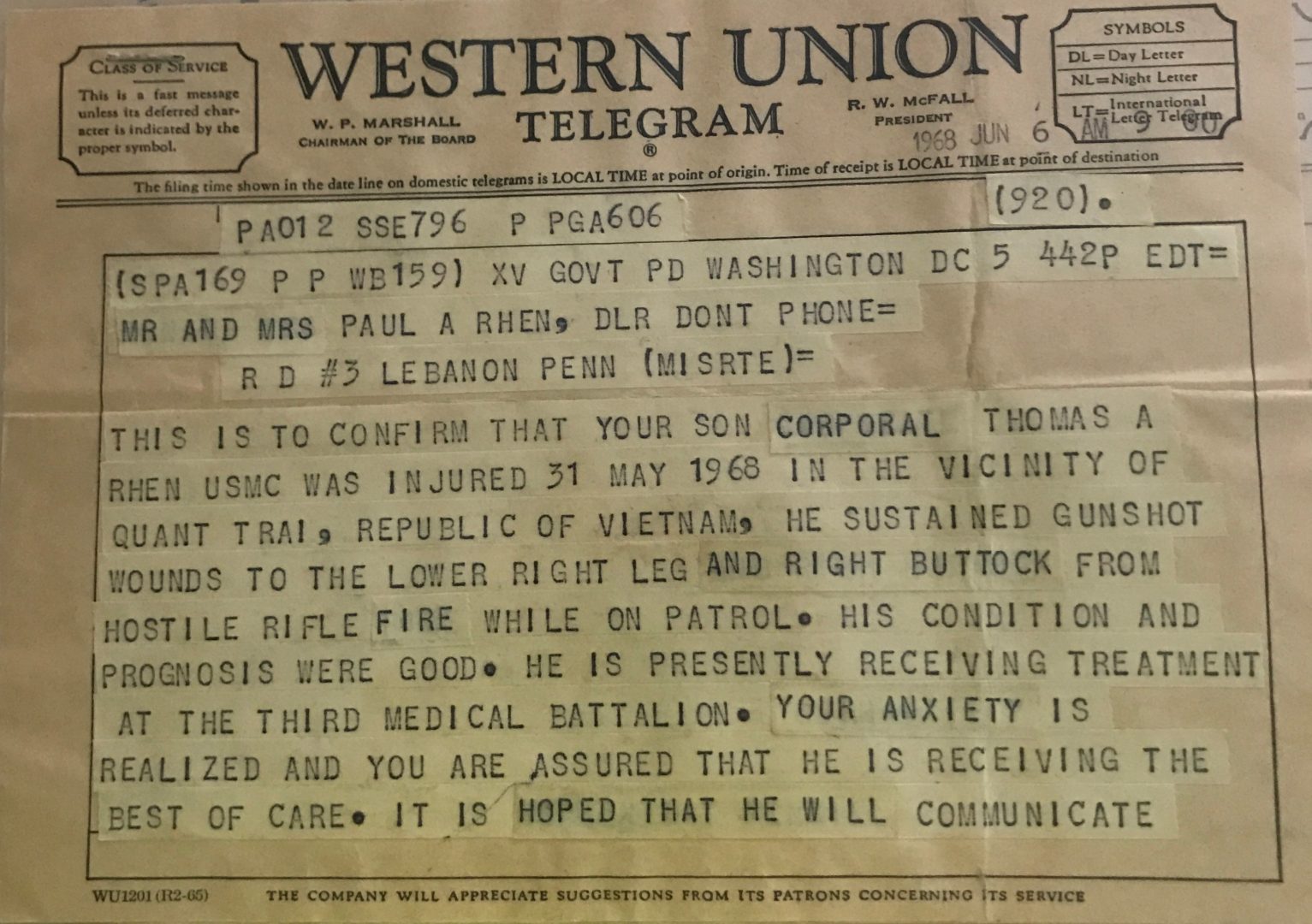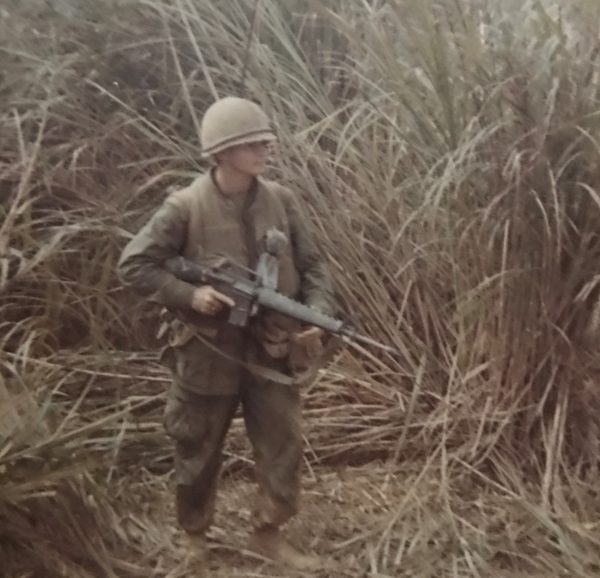In May 1968 I was a Corporal with Company I, Third Battalion, Ninth Marines, (I-3/9) of the Third Marine Division. We were operating in Quang Tri Province, and in fact, for most of the time I was in Viet Nam my company operated in the Cam Lo and Gio Linh Districts of that province. At the end of May I was a fire team leader with three men serving under me as part of the third platoon of Company I.
May 31 our company was to serve as a security force for a group of engineers using bulldozers to clear land in order to build a road. We spent the previous night at C—2 combat base along Route
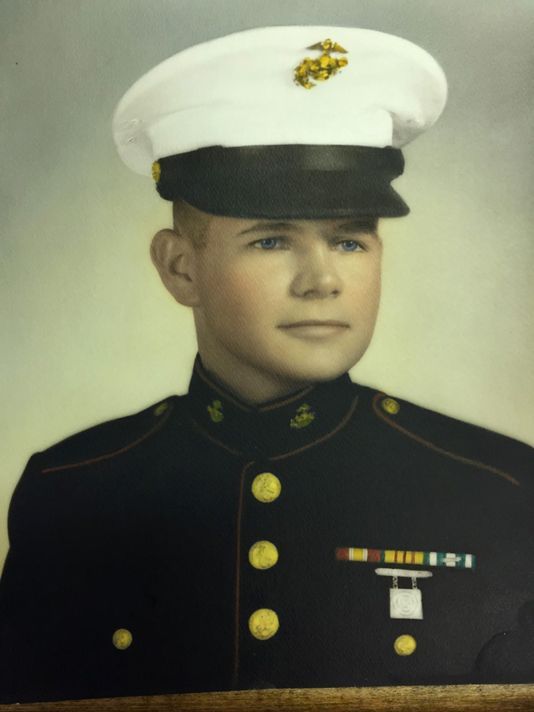
Thomas Rhen
561 which runs from Cam Lo to Con Thein. In the morning, we moved out of the base along with the engineers in a northeasterly direction. We only went two or three miles by mid—day, due to the slow progress of the engineers. As a result, our job was fairly easy, even though. we were moving through the wooded area beyond the bulldozers most of the time. As far as can remember, the First Platoon was in the lead, with my platoon, the third, next. I do remember that my squad was on the right flank in the woods, but I can’t remember if the Second platoon was on the left flank, or if they were behind the Third Platoon, with both platoons covering both flanks.
Near mid—day we stopped to eat our C—rations. Shortly after one p.m. we were preparing to move forward again when the firing started near the front of the company. My platoon immediately moved forward to support the first. We moved to the edge of the woods and got on line to move across an open area of dry rice paddies. On the far side were hedgerows on top of the dikes between the paddies, and beyond that another tree line, inside that far wooded area was a regimental command group of the North Vietnamese Army. They were equipped with mortars and apparently had radio communications with artillery support inside North Vietnam, only a few miles away.
We started across the open area, moving by individual rushes. This is where one man runs forward about ten yards and falls flat on the ground until the men next to him do the same to catch up. We moved across the open area in a direction to the left front. My fire team was on the left end of my squad. Another squad was to my left. When we reached the far side, a gap had developed between my squad and the squad on my left, caused by the hedgerows. The other squad was out of sight and I wasn’t sure how far to the left they had gone, but there was a gap of at least twenty or thirty yards of open ground between my position and the other hedgerow. I knew it was up to me to close the gap in the line by making contact with the other squad, and that I would have to cross that open space to do so.
After passing the word down to the right in the direction of the Platoon Commander, I started to run toward the left where I thought the other squad was. When I got about three quarters of the way across the open area a bullet hit me in the right shin. It felt like someone had hit me with a sledge hammer. I went down to my knees but kept moving to get under cover of the hedgerow. I shouted, “I’m hit” and another Marine was there with me almost right away. I don’t remember who he was or where he came from. We put two field dressings on my leg, and I could feel the bone fragments grating in my leg, so I knew it was broken. As it turned out both bones in my lower leg were shattered. There was a small hole in the front of my leg where the bullet entered, and a larger hole in my inner calf where bone and bullet fragments had exited.
After we put the dressings on my leg we began to return fire in the direction of the NVA positions. We remained there and continued to fire for some time, maybe ten or fifteen minutes. It’s hard to remember after all these years. After the firing died down we began to move back toward the rear of the company so I could be evacuated. Two Marines were helping me now, and we moved about forty or fifty yards along the hedgerows when we started to receive some sniper fire. We stopped to take cove behind the hedgerow, and when I sat down I was shot for the second time. The bullet entered my upper right thigh on the inside near the groin. The force of the bullet picked me up off the ground a foot or two and flipped me over onto my stomach. The burning and pain made me think the bullet had gone up into my lower abdomen. It sapped all my strength and at that time I thought I was going to die. As it turned out the bullet passed over my femur in the crease between the thigh and groin, but didn’t exit. That bullet is still in my thigh, just below the hip on the outer side of my right hip.
The other two Marines picked me up again and started out across the open area toward the rear of the company. We didn’t get far before the NVA artillery started coming in on us. A round landed behind us and all three of us were hit by shrapnel.
I was hit in the left thigh by three pieces. The other two were hit but I don’t ‘know how badly they were wounded. By that time, I thought I was done for. I just lay there with my face in my helmet, unable to move. At that time, I told the other two I was done for and that they should leave me and get to cover. I thought they had done as much for me as possible, and didn’t want to needlessly expose them any more trying to get me evacuated. I have never been able to find out who those two Marines were,
I stayed there in the open, lying flat on my stomach for quite some time. I don’t if I passed out or not, but the next thing I remember it was quiet and there was no activity near me that I could tell of. After a while I figured I might live after all and I began hoping someone other than the NVA would come back for me.
I guess I stayed in that position out in the open until it started to get dark. Then I dragged myself back to the hedgerow to about the same place I had been shot the second time. I got as far into the brush as possible so I would be out of sight. Since my leg was not splinted the movement caused a lot of pain, and I could only move in a head first direction. I had to pull myself slowly with my hands and elbows. During the night I had no weapons, water or food. I did have a small tin of jelly from C—rations and can opener on my dog tag chain. I ate the jelly with my fingers and then tried to catch rain water in the can and my helmet for drinking. I also tried to lick the rain off the leaves. I know I slept some during the night, and I wasn’t really afraid of anything. I did hear some movement during the night, but no one ever came close to me that I know of.
all the protection I had was my helmet and flak jacket, and they don’t stop bullets
In the morning, the artillery started coming in and some jets bombed the area, so I knew someone would be back for me soon. None of the artillery came close to me, but some bombs did fall close enough to sprinkle me with dirt. Some helicopters came over and fired into the trees, and some jets also fired rockets into the area. After that preparation, I heard the tanks coming. At first I thought they were going too far to the right, and I was afraid they would miss me. Then they turned more in my direction, and I could tell they were getting on line to move across the open area as we had done the day before. Before moving across the open area, the company, as well as the fifty caliber machine guns on the tanks, began firing into the tree line beyond me. Some of the firing was also coming into the hedgerow where I was hiding. I could hear the rounds going through the leaves just a foot or two above my head and small pieces of leaves and twigs were falling on me. I was more scared at that time than I had ever been before. I was above ground level and all the protection I had was my helmet and flak jacket, and they don’t stop bullets.
When the firing stopped, the company started to move in my direction. I soon heard Sergeant Ballew giving directions to the men and I called to him by name. Ballew and I knew each other because we had been in First Platoon together for several months. When he heard me call out he asked who it was and I said “Rhen!” He asked, “Is he dead?” and I said “No, It’s me. I’m alive!” He was making his way to me by following my voice. The first one to find me was Jim Daugherty. He recently told me he almost shot me when he first saw me. Then Sergeant Ballew got to me, and they soon had a Corpsman there to treat me. By that time had a lot of pain in both legs. We used an M-16 rifle barrel for a splint, and they used a poncho for a stretcher to carry me to the med—evac helicopter. I was soon on my way to the hospital at Dong Ha.
When I got to the hospital at Dong Ha and the corpsmen started cutting away my uniform the one said I really stink. I told them I had been wounded the day before and spent the night out in a rice paddy. Then he said “Well, I guess you’re lucky to be here at all then.” After they cleaned me up and started an IV they put a temporary cast on my leg and then sent me to the hospital in Da Nang. I spent the night in Da Nang and the next day was flown out to the Navy Hospital on Guam. I spent a month on Guam and had five operations on my legs.
I later found out we had eleven men killed in action that day including my good friend Mike Machie. We also had sixteen wounded. I never knew much about what went on that day except for what I saw and experienced. Some of the things I have written about here I have found out only recently from other Marines who were there those two days.
I never had any ill feelings for what happened to me. I was shot the first time because I exposed myself to the enemy Just doing my job. Later, when I was wounded for the third time, the two Marines who were trying to get me to safety only left me after they were both wounded in the process, and only after I told them to leave me. I honestly thought I was nearly dead and didn’t want to expose them to further danger, just to rescue a dead body. Later, when I knew I wasn’t about to die, I had no doubt that I would be rescued. That is a Marine Corps tradition. Even though they thought I was dead, I knew they would be back to retrieve the bodies. But instead of finding twelve bodies, there were only eleven, plus me.
I arrived back in the States in July, and eventually arrived at the Navy Hospital in Bethesda, Maryland on July 5, 1968 exactly two years after I left home for boot camp, on July 5, 1966. I stayed in that hospital for treatment and recuperation for eight more months. I received a medical retirement from the Marine Corps on March 15, 1969.
Read article from Lebanon Daily News: Just Folks: Retired Lebanon fire fighter recalls Vietnam War experience


